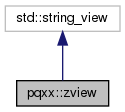Marker-type wrapper: zero-terminated std::string_view.
More...
#include <zview.hxx>

Public Member Functions | |
| constexpr | zview () noexcept=default |
| constexpr | zview (const char text[], std::ptrdiff_t len) |
| Convenience overload: construct using pointer and signed length. More... | |
| constexpr | zview (char text[], std::ptrdiff_t len) |
| Convenience overload: construct using pointer and signed length. More... | |
| template<typename... Args> | |
| constexpr | zview (Args &&... args) |
| constexpr char const * | c_str () const noexcept |
| Either a null pointer, or a zero-terminated text buffer. More... | |
Detailed Description
Marker-type wrapper: zero-terminated std::string_view.
- Warning
- Use this only if the underlying string is zero-terminated.
When you construct a zview, you are promising that the underlying string is zero-terminated. It otherwise behaves exactly like a std::string_view. The terminating zero is not "in" the string, so it does not count as part of the view's length.
The added guarantee lets the view be used as a C-style string, which often matters since libpqxx builds on top of a C library. For this reason, zview also adds a c_str method.
Constructor & Destructor Documentation
◆ zview() [1/4]
|
defaultnoexcept |
◆ zview() [2/4]
| constexpr pqxx::zview::zview | ( | const char | text[], |
| std::ptrdiff_t | len | ||
| ) |
Convenience overload: construct using pointer and signed length.
◆ zview() [3/4]
| constexpr pqxx::zview::zview | ( | char | text[], |
| std::ptrdiff_t | len | ||
| ) |
Convenience overload: construct using pointer and signed length.
◆ zview() [4/4]
|
explicit |
Member Function Documentation
◆ c_str()
|
noexcept |
Either a null pointer, or a zero-terminated text buffer.
Referenced by pqxx::result::column_number(), pqxx::connection::connection(), pqxx::connection::encrypt_password(), pqxx::transaction_base::exec_prepared(), pqxx::connection::prepare(), and pqxx::connection::unesc_raw().
The documentation for this class was generated from the following file:
